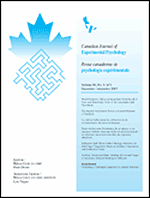
Social Cognitive and Affective Neuroscience
Scope & Guideline
Leading the Charge in Affective Neuroscience Research
Introduction
Aims and Scopes
- Social Neuroscience:
The journal emphasizes the neural mechanisms involved in social interactions, exploring how social contexts influence cognitive and emotional processing. - Cognitive and Affective Processing:
Research published in this journal focuses on understanding the neural correlates of cognitive and emotional processes, including empathy, decision-making, and emotion regulation. - Neuroimaging Techniques:
The journal predominantly features studies utilizing advanced neuroimaging techniques such as fMRI, EEG, and TMS to investigate brain activity related to social and emotional cognition. - Developmental Perspectives:
There is a notable interest in how social cognitive and affective processes develop across the lifespan, particularly in children and adolescents. - Clinical Applications:
The journal also explores clinical implications, investigating how social cognitive and affective neuroscience can inform understanding and treatment of mental health issues.
Trending and Emerging
- Inter-brain Synchronization:
A significant trend is the investigation of inter-brain synchrony during social interactions, emphasizing how neural coupling contributes to effective communication and social dynamics. - Neuroscience of Empathy:
Emerging research increasingly focuses on the neural underpinnings of empathy, exploring how individuals process others' emotions and the impact of social context on empathic responses. - Impact of Social Media and Technology:
Studies examining the effects of social media and technology usage on social cognition, emotional well-being, and brain function are gaining traction, reflecting societal changes. - Neural Mechanisms of Social Influence:
Research is increasingly dedicated to understanding how social influences shape cognitive processes and decision-making, particularly in group contexts. - Genetic and Environmental Interactions:
There is a growing interest in how genetic factors interact with social and environmental contexts to influence emotional and cognitive processing, particularly in developmental studies.
Declining or Waning
- Traditional Psychophysiology:
Research focusing solely on traditional psychophysiological measures without integrating neuroimaging techniques appears to be less prevalent, as studies increasingly adopt multimodal approaches. - Basic Emotion Theory:
There has been a decline in studies solely focused on basic emotion theories, with a shift towards more complex models that consider social context and cognitive appraisal. - Static Social Contexts:
Research that examines social cognition in static or isolated contexts is becoming less common, as there is a growing emphasis on dynamic and interactive social environments. - Single-Sample Studies:
The journal is moving away from single-sample studies that do not consider broader contexts or multiple cohorts, favoring research that incorporates diverse populations and methodologies.
Similar Journals

Journal of Cognitive Enhancement
Driving Impactful Research in Cognitive Enhancement.Journal of Cognitive Enhancement, published by SpringerNature, is a premier academic platform dedicated to advancing knowledge in the fields of Cognitive Neuroscience, Behavioral Neuroscience, and Experimental Psychology. With an electric combination of rigorous research and innovative practice, this journal has established itself as an essential resource for researchers, professionals, and students interested in understanding the mechanisms behind cognitive enhancement and its implications for mental health and cognitive function. As of 2023, it is recognized in the Q2 and Q3 quartiles across several categories, demonstrating its solid impact in the academic community, particularly with an impressive Scopus ranking of #27/76 in Neuropsychology and Physiological Psychology. Operating in a competitive landscape, the Journal of Cognitive Enhancement fosters open dialogue and collaboration through valuable contributions to cognitive research, facilitating insights that are crucial for practical applications in clinical and educational settings. While specific open access options are currently not defined, we encourage all interested scholars to explore the rich database of published works dating from 2017 to 2024, contributing to this dynamic field of study.

Cognitive Neuropsychiatry
Elevating Discourse: High-Quality Research on Cognitive DisordersCognitive Neuropsychiatry is a distinguished academic journal published by Routledge Journals, Taylor & Francis Ltd, dedicated to the intersection of cognitive neuroscience and psychiatry. With a strong commitment to advancing knowledge in these rapidly evolving fields, this journal provides a platform for high-quality, peer-reviewed research that explores cognitive processes underlying psychiatric disorders. Aiming to bridge gaps between neuroscience and clinical practice, it serves as an essential resource for researchers, professionals, and students alike. As evidenced by its performance metrics, the journal ranks in the Q2 quartile for Psychiatry and Mental Health, and Q3 for Cognitive Neuroscience, showcasing its relevance and growing impact, particularly among a competitive audience. While it does not currently offer open access options, Cognitive Neuropsychiatry remains a vital outlet for disseminating impactful findings, offering insights that shape contemporary psychiatric understanding and interventions.

Neuropsychological Trends
Navigating the Evolving Landscape of Neuropsychological PhenomenaNeuropsychological Trends is a prominent, open-access journal published by LED EDIZIONI UNIV, based in Italy. Since its inception in 2007, the journal has dedicated itself to advancing research in the fields of neuropsychology and cellular neuroscience, catering specifically to the evolving trends shaping these disciplines. With the ISSN 1970-321X and an E-ISSN of 1970-3201, the journal provides a platform for multidisciplinary dialogue and exploration of neuropsychological phenomena. While ranked in the fourth quartile for both Cellular and Molecular Neuroscience and Neuropsychology and Physiological Psychology categories in 2023, the journal encourages innovative research that aims to enhance understanding and treatment of cognitive and psychological conditions. The convergence of years from 2011 to 2024 marks a significant period for contributions that inform clinical practice and theoretical frameworks. As researchers, professionals, and students engage with cutting-edge studies and reviews, Neuropsychological Trends serves as a vital resource for staying informed and fostering collaboration in the neuropsychological community.

COGNITION & EMOTION
Illuminating the Interplay Between Mind and EmotionCOGNITION & EMOTION is a leading academic journal published by Routledge Journals, Taylor & Francis Ltd, focusing on the dynamic interactions between cognitive processes and emotional responses. Established in 1987, this esteemed journal has made significant contributions to the fields of Arts and Humanities, Developmental and Educational Psychology, and Experimental and Cognitive Psychology, consistently ranking in the top quartile (Q1) across various categories. Housed in the United Kingdom, COGNITION & EMOTION boasts a remarkable impact factor, underscoring its influence and importance in advancing psychological research and theory. While this journal does not offer open access, it remains a vital resource for scholars, professionals, and students seeking to deepen their understanding of emotional and cognitive phenomena. With a commitment to rigorous peer-reviewed research and innovative insights, COGNITION & EMOTION is essential for anyone aiming to stay at the forefront of psychological studies.

Journal of Cognitive Science
Innovating Insights in Cognitive ScienceThe Journal of Cognitive Science, with ISSN 1598-2327, is a distinguished publication from SEOUL NATL UNIV, INST COGNITIVE SCIENCE, focusing on the multidisciplinary field of cognitive science. Established in 2016, this journal aims to advance knowledge in various domains, including Artificial Intelligence, Cognitive Neuroscience, and Experimental Psychology, while also delving into Linguistics and Language. Although currently categorized in Q4 for several subjects in the 2023 rankings, it presents an invaluable platform for innovative research and scholarly discourse, providing insights that connect cognitive processes with practical applications, thus fostering cross-disciplinary collaboration. Located in South Korea, the journal adheres to rigorous academic standards, inviting submissions that contribute significantly to understanding cognition in a digital age. While it does not offer Open Access, readers can access articles through university libraries and academic databases, engaging with the latest findings and theories that shape the future of cognitive science.

JOURNAL OF EXPERIMENTAL PSYCHOLOGY-GENERAL
Pioneering Empirical Studies in PsychologyJOURNAL OF EXPERIMENTAL PSYCHOLOGY-GENERAL, published by the American Psychological Association, is a leading journal in the field of experimental and cognitive psychology. With an ISSN of 0096-3445 and a robust impact factor that reflects its significant contribution to research, this journal serves as a premier outlet for empirical studies that advance our understanding of psychological processes across development and cognition. Covering a wide array of topics from developmental neuroscience to general psychology, it is categorized in the Q1 quartile across multiple fields, making it a vital resource for researchers, professionals, and students alike. The journal has maintained a consistent publication record since its inception in 1975, continuously freeing insights that shape the future of psychology and related disciplines. With rigorous peer review and high standards of scholarly excellence, JOURNAL OF EXPERIMENTAL PSYCHOLOGY-GENERAL remains an essential platform for disseminating innovative psychological research.

CANADIAN JOURNAL OF EXPERIMENTAL PSYCHOLOGY-REVUE CANADIENNE DE PSYCHOLOGIE EXPERIMENTALE
Exploring the Depths of Psychological ResearchCanadian Journal of Experimental Psychology / Revue canadienne de psychologie expérimentale (ISSN 1196-1961, E-ISSN 1878-7290), published by the Canadian Psychological Association, serves as a vital resource in the fields of Experimental and Cognitive Psychology and general psychological research. With a respectable impact factor that places it in the Q3 category for both Experimental Psychology and miscellaneous Medicine (2023), this journal offers a platform for innovative research that furthers our understanding of psychological processes. Spanning years from 1993 to 2024, it connects researchers, professionals, and students to contemporary findings and methodologies, fostering a collaborative environment for the advancement of psychological science. Though it does not currently offer Open Access, the journal's commitment to quality and relevance in psychological research continues to make it an important part of the academic landscape, supporting the dissemination of knowledge within a global community.

Current Opinion in Behavioral Sciences
Advancing Insights in Neuroscience and Mental HealthCurrent Opinion in Behavioral Sciences, published by ELSEVIER, is a premier academic journal that provides insightful and comprehensive reviews of contemporary research in the fields of behavioral neuroscience, cognitive neuroscience, and psychiatry and mental health. With an impressive Q1 ranking in multiple categories and Scopus rankings that highlight its influence—4th in Behavioral Neuroscience and 8th in Cognitive Neuroscience—this journal has positioned itself as a leading platform for disseminating high-quality scholarly work. Accessible to readers in the United Kingdom and beyond, it plays a vital role in advancing knowledge and understanding of behavioral science and its applications. Its impact is further underscored by its percentile rankings in key fields, making it an essential resource for researchers, professionals, and students seeking to stay abreast of the latest developments and trends from 2015 to 2024. This journal aims to bridge the gap between cutting-edge research and practical application, fostering a collaborative and interdisciplinary approach to pressing issues in behavioral sciences.

Social Neuroscience
Illuminating the Links Between Social Interaction and Brain FunctionSocial Neuroscience is a premier academic journal dedicated to advancing the interdisciplinary field that lies at the intersection of social psychology, behavioral neuroscience, and developmental studies. Published by ROUTLEDGE JOURNALS, TAYLOR & FRANCIS LTD, this journal has made significant strides since its establishment in 2006, with a convergence period extending to 2024. It regularly features innovative research articles that explore the neural basis of social behaviors and the impact of social interactions on brain function. Holding esteemed rankings in Scopus, including Q2 status in both Development and Social Psychology categories, it appeals to a broad array of scholars and practitioners keen on understanding human behavior through a neuroscientific lens. The journal's commitment to fostering critical discussions and publishing impactful research makes it an essential resource for professionals, researchers, and students alike who seek to deepen their understanding of the complex interplay between social processes and neural mechanisms.

Cognitive Neuroscience
Advancing Understanding of Mind and BrainCognitive Neuroscience is a pivotal journal in the ever-evolving field of cognitive neuroscience, published by Routledge Journals, Taylor & Francis Ltd, in the United Kingdom. Since its inception in 2010, this journal has dedicated itself to publishing innovative research that explores the intricate relationships between neural mechanisms and cognitive processes. With an increasing focus on interdisciplinary studies, it addresses critical issues from both theoretical and empirical perspectives. Although it currently holds a Q3 ranking in the Cognitive Neuroscience category, it has made significant strides in its Scopus ranking, now positioned at #62 out of 115, reflecting its growing impact on the academic community. Researchers and professionals will find the journal an invaluable resource for staying updated on the latest findings and methodologies in the field. While the journal operates under a traditional access model, it ensures high visibility and dissemination of crucial research that shapes our understanding of the brain's role in cognition. As it continues to evolve through to 2024, Cognitive Neuroscience remains committed to fostering collaboration and inspiring future innovations within the discipline.